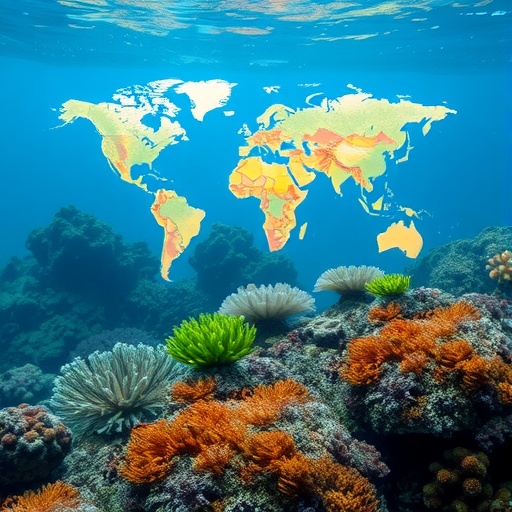A recent study published in Coral Reefs brings to light the significant variations in thermal tolerance among geographically distinct lineages of a key reef-building alga, representing a critical piece of the ecological puzzle that underpins coral reef health. This research, spearheaded by a team comprising T.M. Page, S.Y. Jeong, and G. Diaz-Pulido, delves into the adaptive capabilities of these algal lineages to thermal stress, which is of paramount importance given the pressing threats posed by climate change and marine heatwaves.
Coral reefs harbor a delicate balance of life that is heavily dependent on mutualistic relationships, particularly between corals and algae from the genus Symbiodinium. The health of these reefs is increasingly tested by rising sea temperatures, leading to widespread coral bleaching events triggered by the loss of symbiotic algae. The study reveals that the thermal tolerance of these algal lineages is not uniform, highlighting that genetic and environmental factors can lead to significant ecological resilience or vulnerability.
Investigating multiple algal lineages, the researchers employed a rigorous methodology to assess thermal responses. They subjected different strains of the alga to elevated temperatures and measured several physiological parameters, including photosynthetic efficiency and respiration rates. Such physiological metrics offer insights into the fundamental processes that drive algal health and, by extension, the health of coral reef ecosystems as a whole.
The findings indicate that certain lineages exhibit remarkable resilience, maintaining photosynthetic function better than others under thermal stress. The ability to adapt to changes in temperature is linked to metabolic flexibility, allowing these algae to adjust their cellular processes in response to environmental stressors. This adaptability is not just vital for the algae alone but serves as a lifeline for the coral species that rely on them for nutrients and energy.
Interestingly, the study also finds geographic variations in thermal tolerance, suggesting that local environmental conditions may shape the resiliency of algal populations. Lineages residing in regions that regularly experience fluctuating temperatures may develop adaptations that confer greater heat resistance. This could mean that preserving genetic diversity within algal populations is crucial for maintaining healthy coral reefs, as different lineages may respond uniquely to the challenges posed by climate change.
Moreover, the research highlights the potential for certain algal strains to be used in restoration efforts. By identifying heat-resistant lineages, conservationists might develop strategies to enhance the resilience of coral reefs against thermal stress. These insights bolster conservation tactics that aim not only to protect existing coral structures but also to preemptively bolster their inhabitants’ resilience against future climate disruptions.
In the wake of increasing global temperatures, the implications of this study extend beyond the scientific community, pointing towards an urgent need for policy interventions and management strategies that prioritize the protection of coral reef ecosystems. The findings underscore the importance of sustainable practices in marine resource utilization, as the health of coral reefs is integrally linked to the overall health of oceanic ecosystems.
The research also raises questions about the adaptability of coral reefs in the long term. With marine temperatures projected to rise steadily, understanding the limits of these algal lineages’ thermal tolerances will be crucial in predicting the future trajectory of coral reef ecosystems. Will they adapt quickly enough to survive sustained periods of elevated temperatures, or will we witness alarming rates of reef degradation?
As global awareness around climate change intensifies, studies like this one remind us of the complexity intrinsic to marine ecosystems. The interdependencies between corals and algae illustrate the need for a holistic approach to marine conservation—one that factors in not only the health of individual species but the interconnectedness of life forms within these vibrant ecosystems.
In conclusion, this groundbreaking research serves as a clarion call for further investigation into the genetic mechanisms that confer thermal tolerance among algal lineages. Understanding these processes is critical not only for academic insight but also for developing robust strategies to combat the impending crisis facing global coral reef systems. The ongoing narrative of climate resilience and adaptation will undoubtedly hinge on such research efforts.
By championing genetic diversity and resilience in algal populations, conservationists may unlock pathways to restore reef health and sustain the intricate web of life that these vibrant ecosystems support. As we navigate this era of climate uncertainty, our understanding of the micro-level dynamics within marine ecosystems becomes all the more essential to their survival.
In a world where the impacts of climate change are more pronounced than ever, this study offers a beacon of hope, suggesting that while the challenges are daunting, the resilience of nature may yet prevail with the right actions and understanding. The research emphatically underscores the need for continued scrutiny into the adaptive capabilities of our natural world, reinforcing the idea that we must remain stewards of the earth’s most vulnerable landscapes.
The trends uncovered in this study will undoubtedly provoke further inquiries, as scientists and environmentalists alike seek to unravel the complexities of coral-algal partnerships. It is a reminder that in the face of adversity, adaptation and resilience are not just possibilities—they are necessary for survival.
Understanding the nuances of thermal tolerance among these crucial organisms is not merely an academic exercise; it has real-world implications for the future of biodiversity in our oceans. As we strive to forge a sustainable future, let us not forget the lessons that nature teaches us through resilience, adaptation, and the enduring connections that sustain life.
Subject of Research: Differential thermal tolerances in geographically distinct lineages of a dominant reef building alga.
Article Title: Differential thermal tolerances in geographically distinct lineages of a dominant reef building alga.
Article References:
Page, T.M., Jeong, S.Y. & Diaz-Pulido, G. Differential thermal tolerances in geographically distinct lineages of a dominant reef building alga.
Coral Reefs (2025). https://doi.org/10.1007/s00338-025-02724-8
Image Credits: AI Generated
DOI:
Keywords: Thermal tolerance, Coral reefs, Algal lineages, Climate change, Marine ecosystems, Resilience, Adaptation, Photosynthesis, Marine conservation, Genetic diversity.




